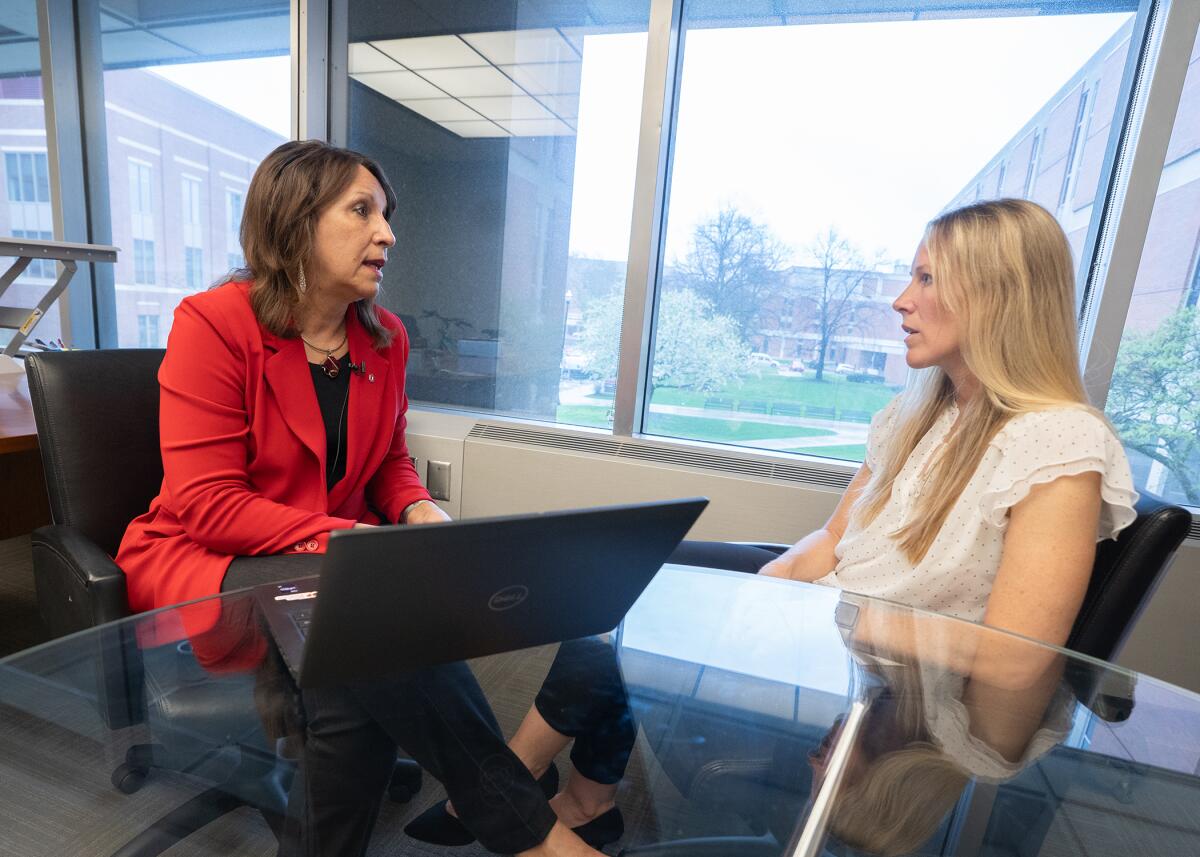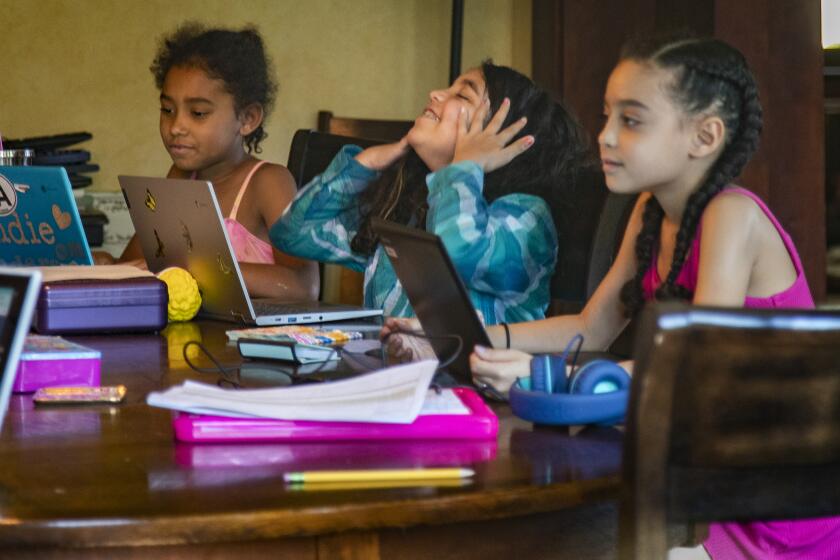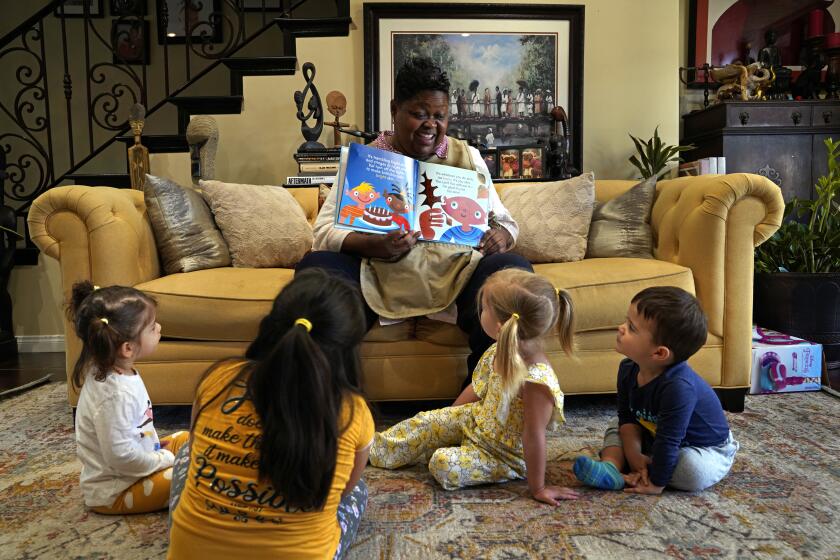Q&A: Parent burnout is real. Here’s what you can do about it

- Share via
It’s been several years since kids returned to their classrooms and workers went back to their offices. We dine indoors at restaurants and don’t hesitate to board a plane for a family trip.
COVID-19 isn’t disrupting our lives like it did in the days of lockdowns, social distancing and mandatory masking. So why are so many parents still struggling like it’s the height of the pandemic?
A report released Wednesday by researchers at the Ohio State University College of Nursing sums it up in two words: parental burnout.
“When the pressures of parenting lead to chronic stress and exhaustion that overwhelm a parent’s ability to cope and function, it is called parental burnout,” the report explains. This condition leaves moms and dads “feeling physically, mentally and emotionally exhausted, as well as often detached from their children.”
In a survey of 722 working parents conducted in June and July 2023, 57% reported symptoms indicative of this modern-day malady. That’s only a small improvement from the early months of 2021, when 66% of parents surveyed were described as burned out.
Report authors Kate Gawlik, a family nurse practitioner, and Bernadette Mazurek Melnyk, the university’s vice president of health promotion and its chief wellness officer, found that people struggling with parental burnout were straining to live up to unrealistic expectations. They felt judged by family and friends if they hadn’t steered their children onto the honor roll and an all-star sports team while planning a picturesque vacation and keeping their homes neat and tidy.

Those are the wrong goals, Gawlik and Melnyk said.
The survey found that the more extracurricular activities a child was involved in, the more likely he or she was to have trouble with concentration, get into fights with other kids, have low self-esteem and exhibit other behaviors that can lead to poor mental health.
However, those risk factors became less likely when children had more time for unstructured play and spent more quality time with their parents.
Not only is there no such thing as a perfect parent, but also, the more you try to be one, the more your efforts will backfire, Gawlik and Melnyk said. They spoke with The Times about what they’ve learned about parental burnout and how to overcome it.
What prompted you to study parental burnout?
Kate Gawlik: We really got interested in this idea of parental burnout during the pandemic. When it started, I had four children, and my oldest was in second grade. I was trying to work and be a parent and home-school and everything. I just had this constant feeling of having to do everything all the time.
I had heard the term “burnout,” but I never really related it to parenting. One day I heard the term “parental burnout” and I was like, that’s what I’m feeling. It’s not like depression, it’s not like anxiety. It’s this very focused burned-out feeling related to being a parent and having to do everything.
We’re in a much better place than we were back then. Does that mean parental burnout is better too?
Bernadette Mazurek Melnyk: People assumed that once the pandemic was over, things would just automatically improve. Our current study shows that’s really not the case. People didn’t just bounce back like a lot of people thought they would.
Suffering from burnout? Many parents are, and experts have advice.
Gawlik: That’s why we wanted to study this again now. We don’t have the same stressors we had before. We wanted to look at what the stressors are now.
And what are they?
Gawlik: I feel like parents now are trying to make up for everything they lost, or felt they lost, during the pandemic.
We have really latched onto this culture of achievement. I see that and I feel that every day. Parents feel this continual pressure to keep up with everybody else. If their kids aren’t in honors classes, they need to get them tutoring so that they are. If they’re not the best at sports, they need to be putting them in even more practices.
It’s this continual cycle of more, more, more, more. How can you not feel burned out?
It’s this continual cycle of more more more more. How can you not feel burned out?
— Kate Gawlik
Melnyk: If a parent feels they’re a good parent, there’s not as much burnout and mental health issues. But if they aren’t feeling good about their parenting, there’s more burnout, more depression, and the kids have more issues. So the self-judgment piece is really key.
What makes someone prone to parental burnout?
Gawlik: Social media is very powerful, and very parent-shaming. A parent can look at social media and be like, “They look like they’re doing everything and they’re so happy and their house doesn’t seem chaotic at all. What’s wrong with mine?”
Melnyk: This whole “perfect parent” image that so many people strive for — it’s really important that parents know there’s no such thing.
Were you surprised to find that parental burnout was still so prevalent?
Melnyk: It was right about where we expected it to be. The pandemic didn’t resolve and then everybody gets back to normal. It takes time.
Were there other findings that did surprise you?
Gawlik: One of the things that I think was so striking was the relationship between child mental health and the number of extracurricular activities that children participate in. This is a great example where maybe as a parent you’re like, “OK, you can get back into sports, you can do everything.” But it’s almost to the detriment because we know that kids need time just to play.
If a teen works hard at the expense of their own well-being, they may struggle with perfectionism.
Kids’ work is to play, and they’re not getting to do that. We’re robbing them of those opportunities because of all this structure. It’s all good intentions — we’re doing it to help our children — but the results of our study show that’s not where we need to be putting our time and focus.
Does burnout at work contribute to burnout at home?
Gawlik: When you’re with your kids, you’re always thinking about the things you need to get done at work. And then when you’re working, you’re always thinking about how you need to help your children. So you’re constantly in this state of turmoil, where you’re feeling this tug from both areas.
Melnyk: Honestly, in all likelihood, if you’re a working parent with children — especially if they have mental health needs — you’re not going to have work-life balance most of the time. That’s another unrealistic expectation.
In your report, you talk about ‘positive parenting.’ What is that?
Gawlik: The goal with positive parenting is building a relationship with your child. A lot of times we miss that relationship piece, or we put it second to what others are expecting of us.
For instance, everyone got very attached to our electronics during the pandemic. We were attached before, but this was on a whole new level because everything now was via Zoom, or via your phone. What that says to a kid is, “My parent is working. My parent is on their phone. I am a second-class citizen to that.” You have to think about how that makes a child feel.
What can parents do to overcome their burnout?
Melnyk: Quality playtime with your kids is so key. Not just being with them and listening with one ear and working on something else at the same time. It doesn’t have to be hours at a time. Whether it’s 10 minutes or 20 minutes, to give your child undivided attention is worth its weight in gold.
Adults need time to still do the things that bring them meaning and joy. If you’re not making time for them, you’re going to burn out much faster. Parents do a great job taking care of everybody else, but they often don’t focus on their own self-care. You can’t pour from an empty cup, and that’s what a lot of parents are trying to do.
A list of crisis hotlines, low-fee and sliding scale counseling, support groups, and mindfulness and meditation services
If a parent is feeling stressed and overwhelmed, the idea of making a change may seem even more stressful and overwhelming. How do you break the cycle?
Gawlik: That can be tricky. When you get into this cycle of burnout — even a cycle of feeling like you’re not a good parent — it can be really hard to break out of it. You’re going to have to make an effort.
When you feel like you can’t literally put one more thing on, that’s when it comes back to shifting your priorities. What can you give up to make the mental capacity to do it? It’s going to look different for every parent.
My house is a mess 90% of the time and I’m not feeling bad about it anymore. I’ve just tried to reframe it. My kids are creative. Our toys are all over because the kids are playing with them and not sitting in front of a screen. I’m OK with the fact that my house is not clean all the time now because I can’t do that along with everything else that I’m doing and feel like I’m successful.
This interview has been edited for length and clarity.










